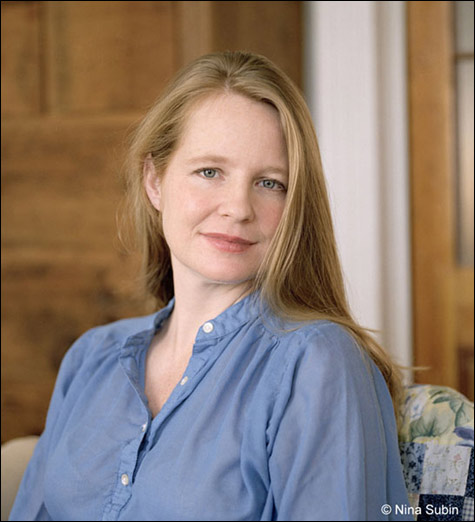
A PARTIAL INVENTOR Historical-fiction writer Samantha Hunt. |
A solemn pigeon, a rolling thunderstorm, flecks of dust, a statue of Johann Wolfgang von Goethe in Manhattan's Bryant Park: nearly everything | SAMANTHA HUNT reads from The Invention of Everything Else | Mariner Books | 257 pages | $13.95 | March 16 @ 4:15 pm | at Chase Hall, Bates College, Lewiston | 207.786.6330 | March 17 @ 7 pm | at Portsmouth Public Library, 175 Parrott Ave, Portsmouth NH | 603.431.2100 | Free |
speaks in The Invention of Everything Else, Samantha Hunt's second novel. Most of the time, the world's sounding board is the aging eccentric Nikola Tesla, real-life inventor of alternating-current electricity, radio waves, and a death ray he believed could end all war in the world. In what may as well be a commentary on his disgraced state — Tesla believed energy should be free for all, and fame- and money-hungry patent-seekers reaped the benefits of his ideas and altruism — he's residing in 1943 at the New Yorker Hotel, the Manhattan hotel so large it held its own, direct-current, power plant. (The hotel switched to AC power in the 1960s, long after Tesla's death.) SAMANTHA HUNT reads from The Invention of Everything Else | Mariner Books | 257 pages | $13.95 | March 16 @ 4:15 pm | at Chase Hall, Bates College, Lewiston | 207.786.6330 | March 17 @ 7 pm | at Portsmouth Public Library, 175 Parrott Ave, Portsmouth NH | 603.431.2100 | Free
Tesla is essentially alone — he speaks to a pigeon he refers to as his wife, and he's reciting his memoirs to Samuel Clemens (Mark Twain), who by this time has been dead for over two decades — until a plucky 24-year-old chambermaid named Louisa becomes intrigued by the strange old man on the 33rd floor after she learns he's responsible for a complete blackout in the hotel. The two bond over unlikely similarities — Louisa also cares for pigeons, and is awestruck by radio technology — and spur each other's imaginations, despite the fact that they've become wary of idealism.
Their relationship is somewhat crudely synergistic, as all of Louisa's companions have dreams as unlikely as Tesla's. Louisa's father, still mourning a wife who died in childbirth, endeavors to try a time-traveling machine his long-lost friend Azor is building; and her new suitor, Arthur (who is possibly from the future), is an engineering whiz helping to construct the device. Tesla's history of disappointment anchors Louisa's skepticism about their scheme, but at the same time, his wondrous achievements give her pause.

Despite being overstuffed with tangential subplots, too-convenient characters, and predictable plot mechanics, The Invention of Everything Else brims with Tesla's prescient ideas about energy. Hunt's novel is thoroughly researched and endearingly enamored with its subjects. Even things that sound like literary license, like Tesla's friendship with a white pigeon, turn out to be true; only Louisa's half of the story — perhaps the titular "everything else" — is an invention. The Hotel New Yorker reads like a character unto itself, and in addition to Twain, there are cameos by George Westinghouse, Thomas Edison, and Orson Welles's War of the Worlds radio broadcast, among other fleeting guests. (Quotes Hunt borrows from historical documents are cited in the back of the book.)
Hunt's frequent descriptions of Tesla's distinct physicality (he was quite tall and looked every bit the mad scientist he was made out to be) feed off one another, building Tesla into the figure Hunt clearly believes deserved to be more treasured than he was: "a gorgeous switchblade," he's "[a] stooped, slightly disheveled man wearing a haunted suit, a ghost with cheeks sucked in tight to the bone," and "an elegant, tired grasshopper." In the eager but worrisome Louisa, Hunt creates an ideal audience surrogate: surrounded by eccentrics, Louisa's Veronica Mars-ish blend of curiosity and cynicism keeps Hunt's predilection toward whimsy in check.
And, by and large, Hunt's fondness for historical trivia enhances the novel's main thematic undercurrent, a resonant argument favoring free, open-source technology. Tesla's ideal is most explicitly discussed in his embittered memoirs, where he longs to bring "capitalists like [J.P.] Morgan to their knees," but it pervades the novel's more quiet moments, too; each bolt of lightning is energy unused, just like the currents moving through our bodies. Hunt's prose embodies the hyper-sensory, wonderstruck potential of Tesla's ideas ("Louisa is holding so fast that every muscle in her body feels like it is made of the most brittle quartz, rigid with alarm and excitement."). Chief among its many pleasures are that the first impulse you have after reading The Invention of Everything Else is to step outside, look around, and think about just what we're made of.
Christopher Gray can be reached at cgray[a]phx.com.